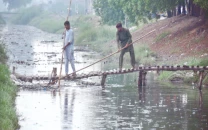PIC medicine case: Apex court looks at lessons from killer pill tragedy
Bench expresses concern over rising rate of polio and hepatitis C.

A full bench of the Supreme Court (SC) holding suo motu proceedings in the Punjab Institute of Cardiology (PIC) medicine disaster raised six health issues and sought the assistance of five senior doctors by February 22.
One of the issues includes how best to regulate licences and the manufacturing of drugs in Pakistan in order to ensure quality control, specifically with regard to the composition and working of the Federal Drug Regulatory Authority. It also includes investigating the factors which have led to the resurgence of polio and the rise of hepatitis C in the country and measures to combat this challenge, compensating the families who lost their loved ones after treatment at the PIC, ensuring that the Sheikh Zayed Hospital works along professional lines, streamlining the work of government-run hospitals to ensure better health care, and working on how best to impose the service structure of doctors in government service to ensure their genuine grievances are addressed.
The bench also issued a notice to Tariq Ikram, the acting chief of the Pakistan Pharmaceutical Manufacturers Association (PPMA).
The SC also chided the Young Doctors Association (YDA) for protesting and going on strike, although the strike was called off earlier last week. Justice Saqib Nisar observed, “A strike is unjustifiable in your profession. What will a father feel if a doctor declines to treat his child?”
The bench also directed the health secretary to produce a list of those who died on account of consuming the fatal pill, Isotab, at the PIC. Earlier on Monday, Punjab Advocate General Ashtar Ausaf Ali informed the court that doctors and pharmacists who were suspended have been reinstated.
In response to a court query, the health secretary submitted that the provincial government was conscious of the need that Sheikh Zayed Hospital, now entrusted to the Punjab government on account of devolution, be run along professional lines and given autonomy to achieve this objective.
Regarding the statement issued by PPMA acting chief Tariq Ikram saying that there has been a massive increase in licence issuances to drug manufacturers over the last couple of years and that 40 per cent of the drugs in the market are spurious, the health secretary submitted that he is not in a position to give an exact figure on faulty medicines in the market.
He said that while the PIC medicine tragedy was unfolding, suspect medicines were sent to laboratories of international repute and one out of five was found to be substandard. The health secretary was of the opinion that this figure indicated that local drug manufacturing is not as substandard as is presented to the public.
YDA General Secretary Syed Nasir Abbas also submitted that some of the organisation’s demands have still not been accepted by the Punjab government, which include that their services be regularised.
Advocate General Ali submitted that he would get in touch with the concerned people receive suggestions in regard to the issues raised in court.
The bench also observed that the rise of polio and hepatitis C could be caused due the malfunctioning of the drug regulatory authority mechanism.
It also appreciated the prompt action taken by the prime minister and three chief ministers which culminated in the constitution of a Federal Drug Regulatory Authority.
The senior doctors the bench sought assistance from to ensure the authority is run smoothly include Professor Dr Jawad Zaheer, Professor Dr Faisal Masood, Professor Dr Zafar Iqbal of Sheikh Zayed Hospital, former CEO of Sheikh Zaid Hospital Professor Dr Anwar A Khan and Professor Dr Javed Raza Gardezi.
Published in The Express Tribune, February 21st, 2012.



















COMMENTS
Comments are moderated and generally will be posted if they are on-topic and not abusive.
For more information, please see our Comments FAQ